 Petzlover
Petzlover Alano Espanol is originated from Spain but Braque du Bourbonnais is originated from France. Alano Espanol may grow 7 cm / 3 inches higher than Braque du Bourbonnais. Alano Espanol may weigh 15 kg / 34 pounds more than Braque du Bourbonnais. Both Alano Espanol and Braque du Bourbonnais has almost same life span. Both Alano Espanol and Braque du Bourbonnais has almost same litter size. Both Alano Espanol and Braque du Bourbonnais requires Low Maintenance.
Alano Espanol is originated from Spain but Braque du Bourbonnais is originated from France. Alano Espanol may grow 7 cm / 3 inches higher than Braque du Bourbonnais. Alano Espanol may weigh 15 kg / 34 pounds more than Braque du Bourbonnais. Both Alano Espanol and Braque du Bourbonnais has almost same life span. Both Alano Espanol and Braque du Bourbonnais has almost same litter size. Both Alano Espanol and Braque du Bourbonnais requires Low Maintenance.
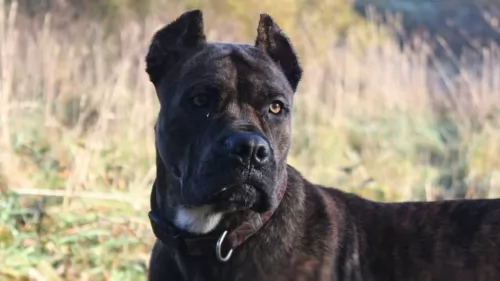 Alano Espanol is a very old breed and first data originate back in the 5th century. Alano has been used as dogs for war and dogs that traveled with explorers. After some, time Alano Espanol becoming more and more popular for bullfights and wild boar hunting. Nowadays, Alano Espanol is still not recognized worldwide, but it seems like this breed is getting more and more popular. They are excellent hunters and amazing working dogs.
Alano Espanol is a very old breed and first data originate back in the 5th century. Alano has been used as dogs for war and dogs that traveled with explorers. After some, time Alano Espanol becoming more and more popular for bullfights and wild boar hunting. Nowadays, Alano Espanol is still not recognized worldwide, but it seems like this breed is getting more and more popular. They are excellent hunters and amazing working dogs.
 The Braque du Bourbonnais is an ancient breed, seen in the 15th century in France in the province of Bourbonnais. He became extremely popular with hunters by the 1800’s as a good pointer. He has become very popular in the United States and all of North America. There are often more puppies born in the U.S. than in France. The British call this breed the Bourbonnais Pointing Dog.
The Braque du Bourbonnais is an ancient breed, seen in the 15th century in France in the province of Bourbonnais. He became extremely popular with hunters by the 1800’s as a good pointer. He has become very popular in the United States and all of North America. There are often more puppies born in the U.S. than in France. The British call this breed the Bourbonnais Pointing Dog.
As with so many European hunting and working dogs, the Braque du Bourbonnais almost disappeared following World War I but was saved by the first breed club, established in 1925. Then following World War II, they were again in danger as the club dissolved and birth rates among the breed decreased drastically.
Actually, there were no dogs at all in the French registry between 1963 and 1973. This was attributed to the fact that the registry put more emphasis on the secondary characteristics such as color, length of tail) instead of the hunting characteristics. Because of this some hunter-breeders vowed to bring the real Braque du Bourbonnais back.
Michel Comte took on this task in 1970 but could not find any dogs with pure Bourbonnais blood. So, he took missed breed with characteristics like the Bourbonnais and inbred several litters until he had a dog he was satisfied with. He registered this dog with the LOF in 1973-75. Seeing this several other breeders got into the act and they successfully brought the breed back.
Michel became president of the new Club du Braque du Bourbonnais in 1981 and remained so until 2001. During this time the breed excelled at field trials and was first sent to the U.S. in 1988. The breed is now thriving in both Europe and North America.
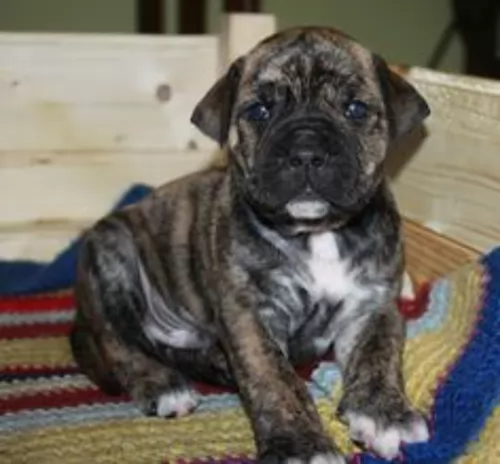 On average, Alano Espanol approximately weights 34-40kg, while their average height is 56-64cm. Females are slightly smaller than male dogs.
On average, Alano Espanol approximately weights 34-40kg, while their average height is 56-64cm. Females are slightly smaller than male dogs.
A lifespan of Alano Espanol variates but on average it is 11 to 14 years.
Litter Size is 4-8 puppies, but it depends on every dog.
Other Names for Alano Espanol are Spanish Bulldog and Spanish Alano.
 This is an elegant breed with a medium sized, muscular bod and a round head. The nose will be the color of the coat and the muzzle is cone shaped with a wide base. He has large dark or hazel eyes, again depending on the color of the coat. The ears can drop below the throat and the neck is very muscular. He has a deep, wide chest and straight, muscular legs. The coat can come in two colors – liver and fawn – and ticked or spotted. They have a typical short pointer type tail.
This is an elegant breed with a medium sized, muscular bod and a round head. The nose will be the color of the coat and the muzzle is cone shaped with a wide base. He has large dark or hazel eyes, again depending on the color of the coat. The ears can drop below the throat and the neck is very muscular. He has a deep, wide chest and straight, muscular legs. The coat can come in two colors – liver and fawn – and ticked or spotted. They have a typical short pointer type tail.
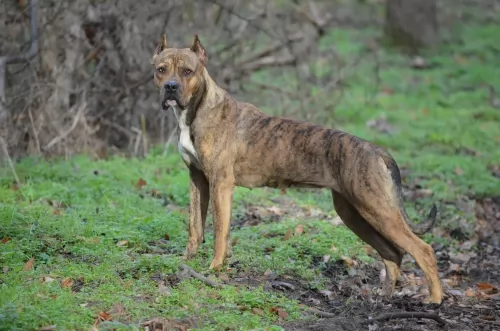 Alano Espanol is an extra-large breed but they are very well balanced breed and they tend to be very reliable and calm. They are not very comfortable living in the small apartments. They are better in houses. They are also very good with kids. Alano Espanol needs a lot of daily exercise with a minimum of 3 walks per day. Even though people used them for dogfights and bullfights through the history. They are not recommended for the first time owners because they are strong-willed dogs who tend to be leaders in the pack. Strong will and constant training are very important for them. They are very dominant breed and have Alpha character. Socialization is also very important for Alano Espanol because they are very powerful and they can easily hurt other animals. They will listen the master but it is important that they play and socialize with other animals from very young age. Alano Espanol can be a very good with other animals even in the same household, but only with proper socialization. If the dogs are the same sex, they tend to show dominance. Basically, they can be amazing pets, but it is important to train them properly.
Alano Espanol is an extra-large breed but they are very well balanced breed and they tend to be very reliable and calm. They are not very comfortable living in the small apartments. They are better in houses. They are also very good with kids. Alano Espanol needs a lot of daily exercise with a minimum of 3 walks per day. Even though people used them for dogfights and bullfights through the history. They are not recommended for the first time owners because they are strong-willed dogs who tend to be leaders in the pack. Strong will and constant training are very important for them. They are very dominant breed and have Alpha character. Socialization is also very important for Alano Espanol because they are very powerful and they can easily hurt other animals. They will listen the master but it is important that they play and socialize with other animals from very young age. Alano Espanol can be a very good with other animals even in the same household, but only with proper socialization. If the dogs are the same sex, they tend to show dominance. Basically, they can be amazing pets, but it is important to train them properly.
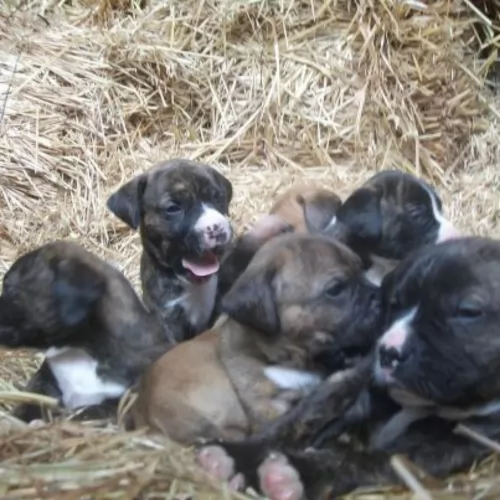 Alano Espanol is a very strong and healthy breed. They do not have any major health issues. Aldo, as with every large breed you should be careful of dogs genetic because they might have dysplasia. However, they are very healthy dogs with no health issues so your dog will live happy and healthy life with a proper care and occasional vet examination.
Alano Espanol is a very strong and healthy breed. They do not have any major health issues. Aldo, as with every large breed you should be careful of dogs genetic because they might have dysplasia. However, they are very healthy dogs with no health issues so your dog will live happy and healthy life with a proper care and occasional vet examination.
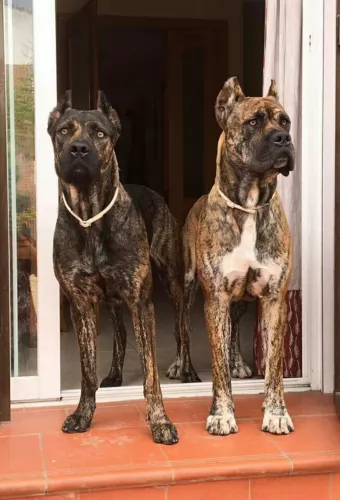 Feeding habits of any dog depend on daily activity and size. Alano Espanol should eat approximately 4-5 cups of high-quality food divided into two meals. You can also add some vegetables, fruit, oil or basically anything that you see your dog enjoy eating.
Feeding habits of any dog depend on daily activity and size. Alano Espanol should eat approximately 4-5 cups of high-quality food divided into two meals. You can also add some vegetables, fruit, oil or basically anything that you see your dog enjoy eating.
Alano Espanol puppies need more food divided into 3-5 meals per day. It is very important that puppy has all the necessary vitamins and minerals to develop into a big and healthy adult.
Alano Espanol is a very easy breed to groom. They have short hair with no undercoat, so minimal grooming is all that it takes. Alano does not drool, so it is not very hard to keep them clean. They will need occasional baths, but only when they are dirty because if you bath your dog too much, the skin could dry and start to itch.
 This breed is prone to weight gain and obesity. Be careful not to overfeed them. Don’t free feed them but give them 2-3 smaller meals per day.
This breed is prone to weight gain and obesity. Be careful not to overfeed them. Don’t free feed them but give them 2-3 smaller meals per day.
Entropion - both of these are issues with eyelashes turning inward or outward and both can
Pulmonic Stenosis of the heart- minor will have no symptoms but eventually the heart will not be able to function efficiently and could lead to congestive heart failure.
The Braque du Bourbonnais needs at least a minimum amount of exercise daily , especially if he is not used for hunting. A fenced backyard for playtime would be perfect but long walks will work. He likes to learn tricks, play ball or hide and seek. Outside activities could include hiking, swimming, agility, retrieving, rally and obedience trials, along with the usual field trials.